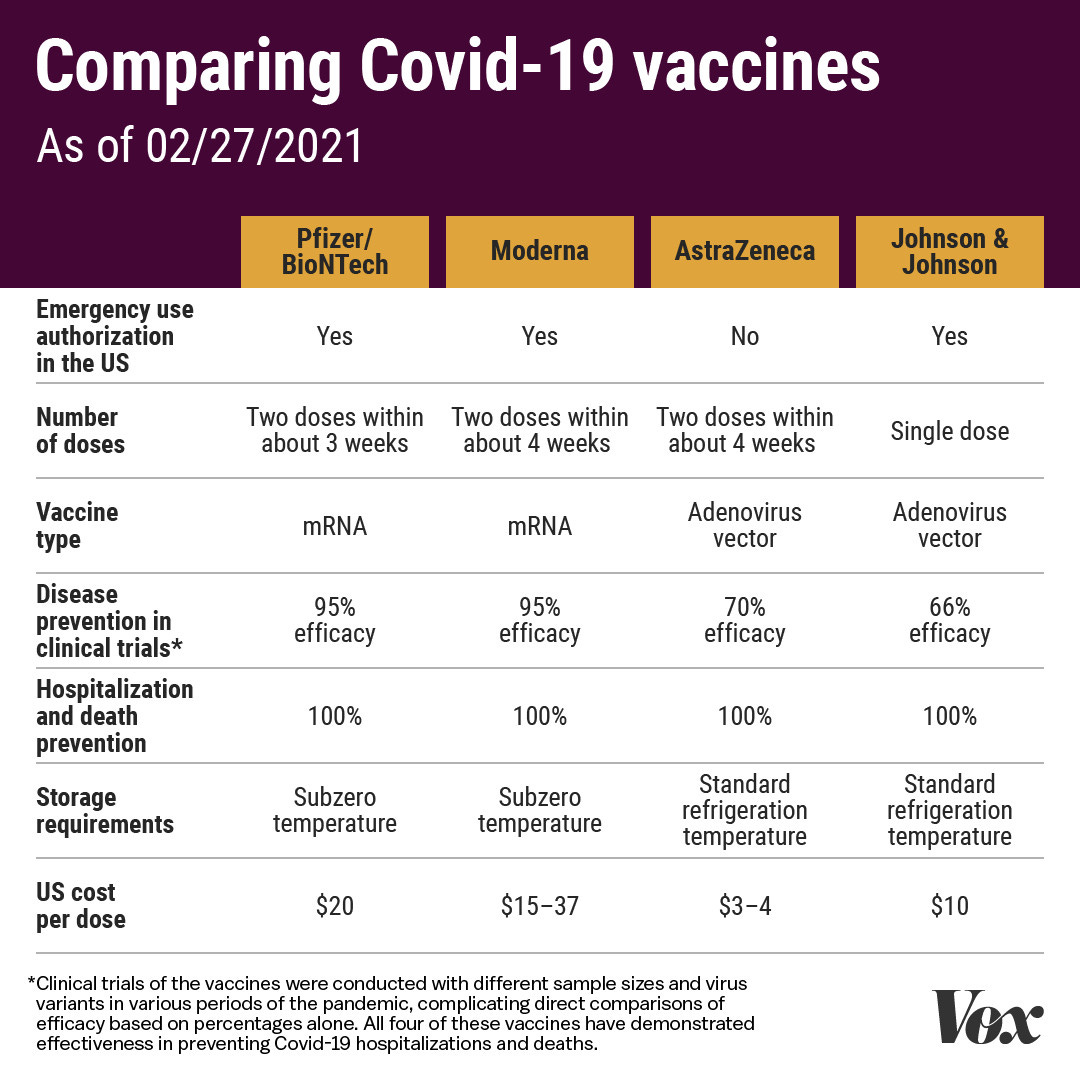Welcome to Plugging the Gap (my email newsletter about Covid-19 and its economics). In case you don’t know me, I’m an economist and professor at the University of Toronto. I have written lots of books including, most recently, on Covid-19. You can follow me on Twitter (@joshgans) or subscribe to this email newsletter here.
The other week I noted that we were going to have a problem with vaccine branding. Here is how people are trying to brand the vaccines.
What they want you to focus on in anything other than “Disease prevention in clinical trials*”. Just look at how that it is done. The name itself is a downplay and then there is an asterix in case you didn’t do what was intended and focussed on that row where it tells you to focus on the next row. This is all very well but, with little else to think about other than vaccines, people are not going to be so easily fooled.
In Germany, there are reports that vaccine shopping is an issue. In Canada, things are going another way with an expert panel recommending against the AstraZeneca vaccine for elderly people (there weren’t enough of them in the clinical trial). Suffice it to say, vaccine comparison shopping is only going to become more of a thing. That leads to this type of recommendation (from Bloomberg):
Communication, key in the heat of any public health crisis, has been poor. Perhaps EU politicians should have echoed Canada’s government, which eloquently pointed out that the benefits of being vaccinated outweighed the risks of not getting the shot. If we are in a race against variants, it makes more sense to jab now than to jab not.
That isn’t quite going to cut it and the Bloomberg article immediately moves towards vaccine market positioning of the kind I recommended.
One idea might be to change the inoculation strategy if positive messaging on these vaccines isn’t cutting through to their current target audience. Estonia and Slovakia, for example, worked through their AstraZeneca supply by offering it to frontline workers and teachers.
Or maybe, screw it, if rich countries don’t want it …
If nothing improves uptake while Pfizer and Moderna deliveries ramp up, then it’s time to do the right thing and share the doses with the developing world, where countries are being forced to wait for scraps as the rich world hoards vaccines. Maybe the risk of sacrificing supply, and the sight of doses leaving the region, is what it will really take to get Europeans to wake up to how lucky they are. If not, this boulder risks rolling downhill a few more times.
I am not against either of these last two recommendations but I think there is a better way.
Setting up the right decision
The issue is that currently, the vaccine decision has been set up incorrectly. This is how Jason Furman summarised it:


In other words, how long would you wait to get the ‘good’ vaccine? As a good economist, Furman highlights the trade-off that has been presented to us: get the ‘bad’ vaccine now or wait some length of time for the ‘good’ one. He then argues that we might have to have experts or the government overrule such individual choice.
Ezra Klien decides that he is going to “take one for the team.”

Suffice it to say, that’s nice but not really how we think most people will behave.
The problem, however, is that the choice as posed here is not the real choice. On a first dose, all vaccine candidates seem to be equally efficacious. Moreover, many do not believe this is the last Covid-19 vaccine you will have and that, in a year from now, you’ll need another. But that last part — getting a booster later — is part of your choice set now. That means your options are:
Wait some period of time to get the ‘good’ vaccine; OR
Take whatever vaccine is offered to you now and then follow up with a dose of the ‘good’ vaccine later.
In other words, there is no reason whatsoever to wait for a ‘good’ vaccine for your first dose. Sure, if both are available now, get the one you want. But if not, get the one that is available now. (I note Alex “First Doses First” Tabarrok suggests the same thing here). You can get the long-term effects later … you know, in the long-term.
There doesn’t appear to be good reason why you can’t mix and match this way (although no public health expert is talking about it which is, of course, why Furman and Klein are not posing their choice with that option). After all, even people who had Covid-19 are getting vaccinated for extra protection. I am happy to be corrected on this assumption.
Summary
Governments need to get real about this. There is a portfolio of vaccines available which is simply amazing. Now it needs to take a portfolio approach.
Inform people about their real choices;
Make it a real choice by guaranteeing that booster shots will be available in the future and people can obtain them.
This is much better messaging then than trying to pump up candidates in ways that just won’t fly and may do more damage.


